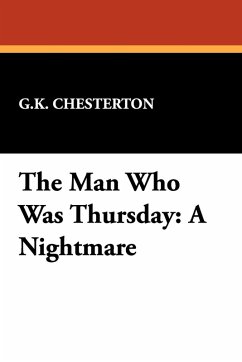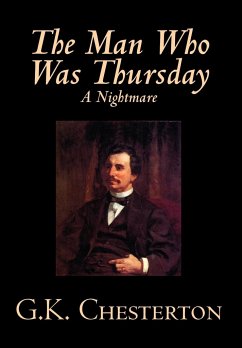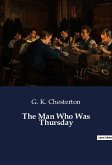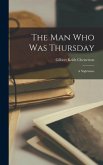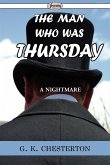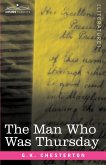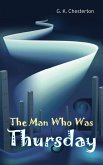- Gebundenes Buch
- Merkliste
- Auf die Merkliste
- Bewerten Bewerten
- Teilen
- Produkt teilen
- Produkterinnerung
- Produkterinnerung
A 'metaphysical thriller,' this novel has been described as "one of the hidden hinges of twentieth-century writing, the place where, before our eyes, the nonsense-fantastical tradition of Lewis Carroll and Edward Lear pivots and becomes the nightmare-fantastical tradition of Kafka and Borges."
Andere Kunden interessierten sich auch für
![The Man Who Was Thursday The Man Who Was Thursday]() G. K. ChestertonThe Man Who Was Thursday22,99 €
G. K. ChestertonThe Man Who Was Thursday22,99 €![The Man Who Was Thursday by G. K. Chesterton, Fiction, Classics The Man Who Was Thursday by G. K. Chesterton, Fiction, Classics]() G. K. ChestertonThe Man Who Was Thursday by G. K. Chesterton, Fiction, Classics36,99 €
G. K. ChestertonThe Man Who Was Thursday by G. K. Chesterton, Fiction, Classics36,99 €![The Man Who Was Thursday The Man Who Was Thursday]() G. K. ChestertonThe Man Who Was Thursday18,95 €
G. K. ChestertonThe Man Who Was Thursday18,95 €![The Man Who Was Thursday The Man Who Was Thursday]() G K ChestertonThe Man Who Was Thursday36,99 €
G K ChestertonThe Man Who Was Thursday36,99 €![The Man Who Was Thursday The Man Who Was Thursday]() G. K. ChestertonThe Man Who Was Thursday13,99 €
G. K. ChestertonThe Man Who Was Thursday13,99 €![The Man Who Was Thursday The Man Who Was Thursday]() G. K. ChestertonThe Man Who Was Thursday16,99 €
G. K. ChestertonThe Man Who Was Thursday16,99 €![The Man Who Was Thursday The Man Who Was Thursday]() G. K. ChestertonThe Man Who Was Thursday22,99 €
G. K. ChestertonThe Man Who Was Thursday22,99 €-
-
-
A 'metaphysical thriller,' this novel has been described as "one of the hidden hinges of twentieth-century writing, the place where, before our eyes, the nonsense-fantastical tradition of Lewis Carroll and Edward Lear pivots and becomes the nightmare-fantastical tradition of Kafka and Borges."
Hinweis: Dieser Artikel kann nur an eine deutsche Lieferadresse ausgeliefert werden.
Hinweis: Dieser Artikel kann nur an eine deutsche Lieferadresse ausgeliefert werden.
Produktdetails
- Produktdetails
- Verlag: Wildside Press
- Seitenzahl: 292
- Erscheinungstermin: 30. August 2024
- Englisch
- Abmessung: 235mm x 157mm x 21mm
- Gewicht: 604g
- ISBN-13: 9781434478986
- ISBN-10: 143447898X
- Artikelnr.: 25880545
- Herstellerkennzeichnung
- Libri GmbH
- Europaallee 1
- 36244 Bad Hersfeld
- 06621 890
- Verlag: Wildside Press
- Seitenzahl: 292
- Erscheinungstermin: 30. August 2024
- Englisch
- Abmessung: 235mm x 157mm x 21mm
- Gewicht: 604g
- ISBN-13: 9781434478986
- ISBN-10: 143447898X
- Artikelnr.: 25880545
- Herstellerkennzeichnung
- Libri GmbH
- Europaallee 1
- 36244 Bad Hersfeld
- 06621 890
Gilbert Keith Chesterton, (29 May 1874 - 14 June 1936), was an English writer, poet, philosopher, dramatist, journalist, orator, lay theologian, biographer, and literary and art critic. Chesterton is often referred to as the "prince of paradox".Time magazine has observed of his writing style: "Whenever possible Chesterton made his points with popular sayings, proverbs, allegories-first carefully turning them inside out. Chesterton is well known for his fictional priest-detective Father Brown,[5] and for his reasoned apologetics. Even some of those who disagree with him have recognised the wide appeal of such works as Orthodoxy and The Everlasting Man.[4][6] Chesterton routinely referred to himself as an "orthodox" Christian, and came to identify this position more and more with Catholicism, eventually converting to Catholicism from High Church Anglicanism. George Bernard Shaw, his "friendly enemy", said of him, "He was a man of colossal genius."[4] Biographers have identified him as a successor to such Victorian authors as Matthew Arnold, Thomas Carlyle, Cardinal John Henry Newman, and John Ruskin. Chesterton was born in Campden Hill in Kensington, London, the son of Marie Louise, née Grosjean, and Edward Chesterton.[8][9] He was baptised at the age of one month into the Church of England,[10] though his family themselves were irregularly practising Unitarians.[11]According to his autobiography, as a young man Chesterton became fascinated with the occultand, along with his brother Cecil, experimented with Ouija boards. Chesterton was educated at St Paul's School, then attended the Slade School of Art to become an illustrator. The Slade is a department of University College London, where Chesterton also took classes in literature, but did not complete a degree in either subject. In September 1895 Chesterton began working for the London publisher Redway, where he remained for just over a year.[14] In October 1896 he moved to the publishing house T. Fisher Unwin,[14] where he remained until 1902. During this period he also undertook his first journalistic work, as a freelance art and literary critic. In 1902 the Daily News gave him a weekly opinion column, followed in 1905 by a weekly column in The Illustrated London News, for which he continued to write for the next thirty years. Early on Chesterton showed a great interest in and talent for art. He had planned to become an artist, and his writing shows a vision that clothed abstract ideas in concrete and memorable images. Even his fiction contained carefully concealed parables. Father Brown is perpetually correcting the incorrect vision of the bewildered folks at the scene of the crime and wandering off at the end with the criminal to exercise his priestly role of recognition and repentance. For example, in the story "The Flying Stars", Father Brown entreats the character Flambeau to give up his life of crime: "There is still youth and honour and humour in you; don't fancy they will last in that trade. Men may keep a sort of level of good, but no man has ever been able to keep on one level of evil. That road goes down and down. The kind man drinks and turns cruel; the frank man kills and lies about it. Many a man I've known started like you to be an honest outlaw, a merry robber of the rich, and ended stamped into slime.


